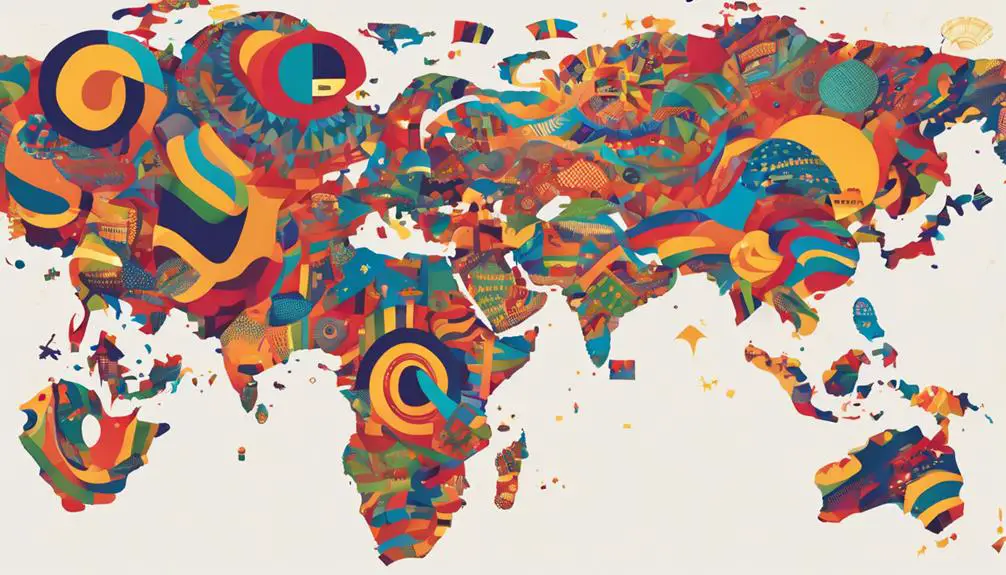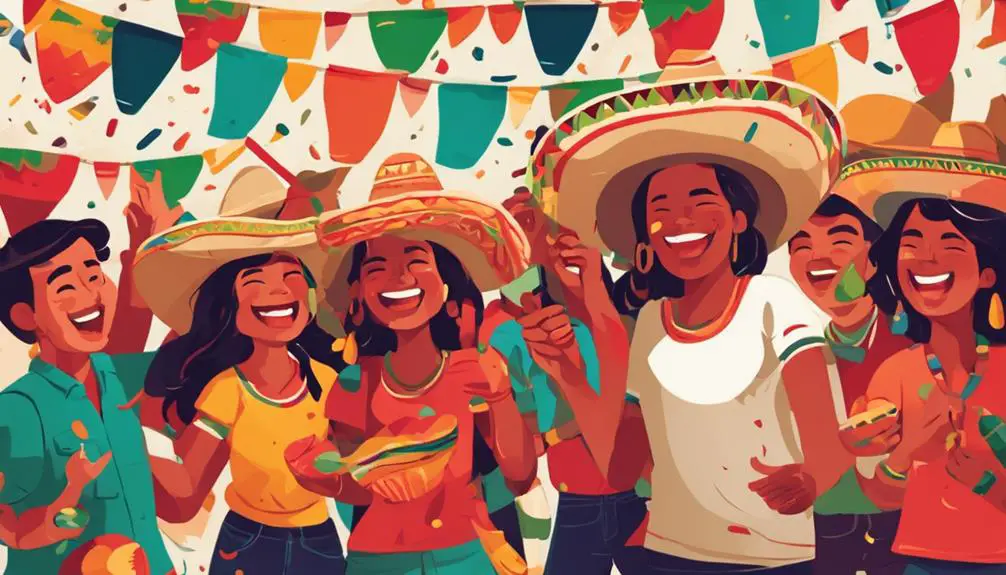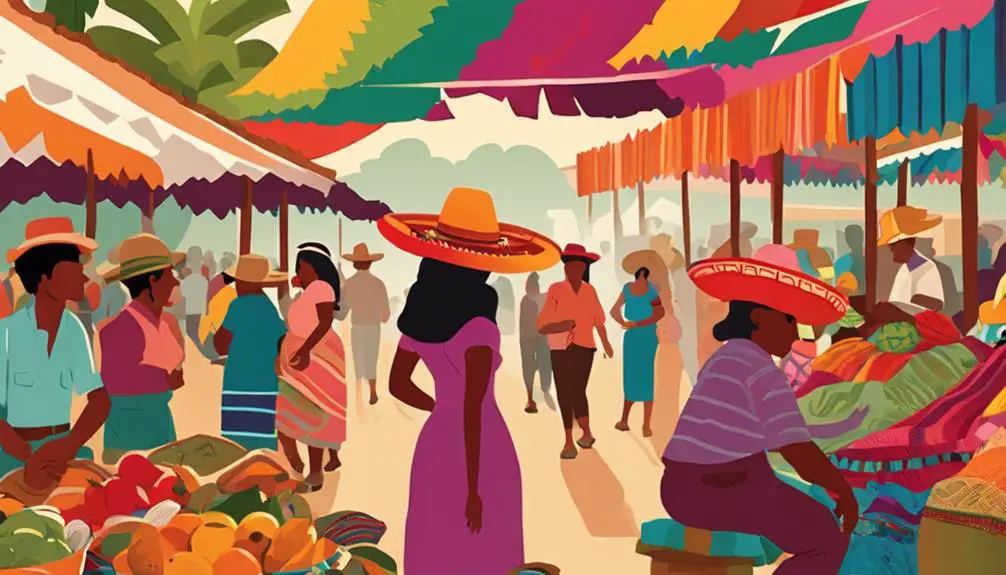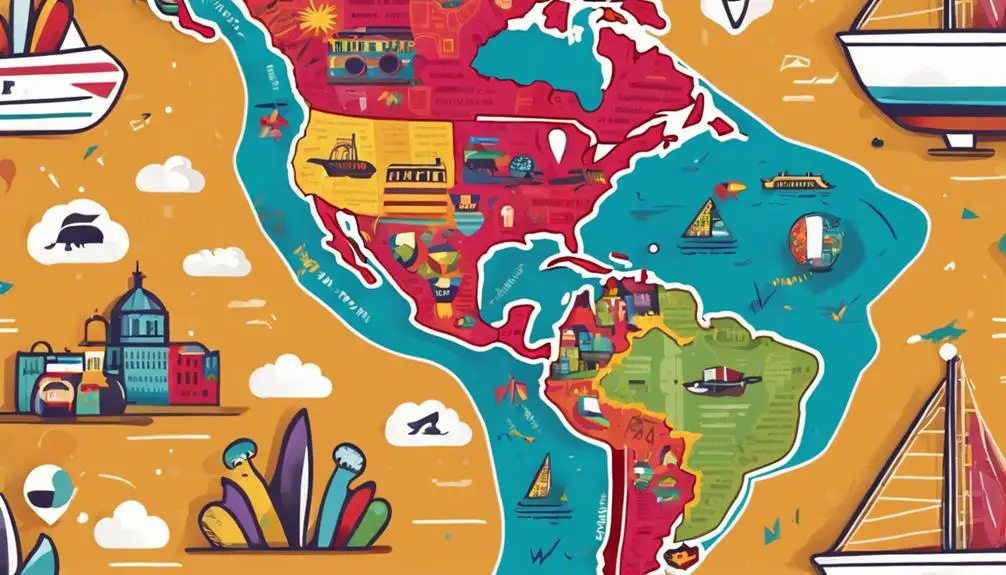You're about to discover the rich world of Spanish slang, where regional flavors and cultural nuances come alive in everyday conversations. To say slang in Spanish, you'll need to explore the unique flavors of each region. From Argentina's humorous expressions to Mexico's colorful phrases, every country has its own distinct slang. In Spain, regional dialects add flavor to everyday conversations. By incorporating regional slang, you'll enhance your conversations and show appreciation for cultural nuances. As you continue, you'll uncover the secrets to mastering informal Spanish vocabulary and authentic conversations that flow like a native speaker's.
Spanish Slang Across the Globe

As you journey across the globe, you'll discover that Spanish slang varies greatly from country to country, with each region boasting its own unique flavor and flair. This cultural fusion is a result of the language's evolution, shaped by the blending of indigenous, African, and European influences.
From the rhythmic cadence of Caribbean slang to the melodic intonations of Andean expressions, each region's slang is a reflection of its distinct cultural identity.
As you explore the diverse world of Spanish slang, you'll realize that it's not just a language, but a key to understanding the global identity of each community. You'll find that Latin American countries like Mexico, Chile, and Peru have developed their own slang, often incorporating indigenous words and phrases.
Meanwhile, European countries like Spain and Gibraltar have their own unique expressions, influenced by African and Moorish traditions.
Embracing the rich diversity of Spanish slang won't only enhance your language skills but also provide a deeper understanding of the cultural nuances and global identity that shape each region's distinct flavor.
Argentina's Unique Slang Expressions
In Argentina, you'll frequently come across unique slang expressions that'll leave you wondering what's being said, but once you decipher the code, you'll reveal a world of humor, wit, and cultural insight.
One of the most iconic expressions you'll hear is 'boludo,' which roughly translates to 'dude' or 'buddy.' But don't be fooled – it's not always a term of endearment. A Boludo Breakdown will help you understand the nuances of this complex expression.
Delving deeper into Argentine slang, you'll discover Lunfardo, a dialect that originated in the late 19th century. Lunfardo Lessons will teach you how to navigate this unique blend of Italian, Spanish, and indigenous languages. You'll learn to recognize words like 'mina' (girl) and 'pibe' (guy), which are essential for understanding everyday conversations.
As you immerse yourself in Argentine culture, you'll find that slang is an integral part of the country's identity. By embracing these unique expressions, you'll gain a deeper understanding of the Argentine psyche and connect with the locals on a more authentic level.
Mexican Slang You Need to Know

You'll find that Mexican slang, like its Argentine counterpart, is full of colorful expressions that'll help you better connect with locals and uncover the country's vibrant culture. When exploring Mexico, you'll come across regional dialects like Norteño phrases from the northern regions and Chilango expressions from Mexico City.
Here are some essential Mexican slang words and phrases to get you started:
| Slang | Translation | Context |
|---|---|---|
| Güey | Dude/buddy | Informal greeting or affectionate term |
| Chido | Cool/awesome | Expressing approval or admiration |
| ¡Hagámoslo! | Let's do it! | Encouragement or agreement |
| ¡No way, José! | No way, no how! | Strong refusal or disagreement |
| ¡Mande? | Huh?/What? | Asking someone to repeat themselves |
Mastering these phrases will help you navigate everyday conversations and show your appreciation for Mexican culture. So, start incorporating them into your conversations and experience the warmth of Mexican hospitality!
Slang in Spain: The Lowdown
Spain's slang is a dynamic reflection of its diverse regions, and you'll find that certain words and phrases can vary greatly from north to south and coast to coast. You'll notice that each region has its own distinct flavor, shaped by local history, culture, and traditions. For instance, the Spanish dialects spoken in Andalusia, in the south, are heavily influenced by the region's Moorish past, while the Catalan dialect, spoken in the northeast, has its own unique grammar and vocabulary.
As you explore Spain's regional accents, you'll pick up on subtle differences in pronunciation, intonation, and vocabulary. In Madrid, the capital, you'll hear a distinct Castilian accent, while in the Basque Country, you'll notice a stronger emphasis on the 'tx' sound. In Valencia, you'll hear a unique blend of Spanish and Valencian, a recognized language in its own right.
To navigate Spain's diverse slang landscape, it's essential to be aware of these regional differences. By doing so, you'll be better equipped to communicate with locals, understand their cultural nuances, and appreciate the rich tapestry of Spanish dialects and accents.
Central American Slang Phrases

Central America's rich cultural heritage has given birth to a vibrant slang that's a unique blend of indigenous, African, and European influences. You'll find that each country in the region has its own distinct flavor of slang, shaped by history, geography, and cultural traditions.
In Costa Rica, you'll hear phrases like 'pura vida' (pure life), which is more than just a saying – it's a way of life. It's about embracing the simple things and finding joy in everyday moments. You might also hear 'tuanis,' which roughly translates to 'cool' or 'awesome.'
Nicaraguan expressions, on the other hand, are known for their colorful metaphors and playful use of language. For example, 'estar en la luna de Valencia' means to be on cloud nine, while 'tomar el pelo' means to tease or joke around.
As you explore the region, you'll discover a rich tapestry of slang that's both fascinating and fun. By learning these phrases, you'll be able to connect with locals on a deeper level and experience the authentic flavor of Central American culture.
South American Slang Basics
As you venture beyond Central America, you'll find that South American slang is a unique blend of indigenous, African, and European influences, shaped by the region's complex history and cultural diversity. You'll encounter a rich tapestry of Colloquial Expressions and Regional Accents that reflect the continent's vibrant cultural heritage.
Here's a snapshot of South American slang basics:
| Country | Slang Expression | Meaning |
|---|---|---|
| Argentina | "Che" | A casual way to address friends or acquaintances |
| Chile | "Pololo/a" | Boyfriend/girlfriend |
| Colombia | "Parce" | Buddy or friend |
As you explore South American slang, keep in mind that Regional Accents play a significant role in shaping the nuances of local dialects. For instance, the Argentine accent is known for its distinctive rhythm and intonation, while the Chilean accent is characterized by its unique pronunciation of the "ch" sound.
Regional Slang in Latin America

Venturing into Latin America, you'll discover that regional slang is a vibrant reflection of the continent's cultural diversity, with distinct dialects and expressions that vary greatly from country to country. As you explore the region, you'll notice that each country has its unique flavor of Spanish, shaped by its history, geography, and cultural heritage.
In the Caribbean, you'll find a distinct blend of Latin dialects infused with African and indigenous influences, giving the region its unique Caribbean flair. Countries like Cuba, Dominican Republic, and Puerto Rico have developed their own slang, which is often characterized by a rhythmic cadence and vibrant energy.
In contrast, countries in Central America, such as Costa Rica and Panama, have a more laid-back and relaxed approach to language, with a focus on simplicity and clarity. Meanwhile, countries in South America, like Argentina and Chile, have developed their own distinct slang, often influenced by European immigration and indigenous cultures.
As you explore further into the world of Latin American slang, you'll discover that each region has its own story to tell, and mastering the local lingo will help you connect with the people and culture on a deeper level.
Using Slang in Everyday Conversations
You'll find that incorporating regional slang into your everyday conversations is key to sounding more natural and building stronger connections with locals. It's not just about throwing in a few trendy phrases; it's about understanding the nuances of slang and how to use it to enhance your conversational flow.
When you use slang correctly, you'll notice a significant improvement in your interactions with native speakers. You'll sound more relaxed, more approachable, and more like a local.
Slang nuances, such as tone and context, are essential to mastering the art of conversational flow. For instance, using the right slang in the right situation can make all the difference in how your message is received.
Mastering Informal Spanish Vocabulary

Becoming proficient in informal Spanish vocabulary requires a thorough exploration of the world of colloquial expressions, idioms, and regionalisms that native speakers use in casual conversations. You might be surprised at how much you can learn from listening to podcasts, watching TV shows, or chatting with native speakers.
Immersion is key to mastering informal Spanish vocabulary.
As you investigate further into the world of informal Spanish vocabulary, you'll start to pick up on nuances and expressions that will make your conversations more natural and authentic. Remember, the key is to immerse yourself in the language and expose yourself to as many different contexts as possible.
Frequently Asked Questions
Can I Use Slang in Formal Writing or Professional Settings?
When you're writing in a formal setting, it's generally best to avoid using slang. You want to maintain a professional tone, right? Using slang can come across as unprofessional and may detract from your credibility.
Instead, opt for formal language that conveys your message clearly and respectfully. Save the slang for casual conversations with friends or social media posts, but not for formal writing or professional settings.
How Do I Know Which Slang Words Are Offensive or Inappropriate?
Did you know that 1 in 5 people have unintentionally offended someone with slang?
When maneuvering through slang, you're not just speaking a language, you're exploring cultural nuances.
To avoid offenses, familiarize yourself with slang etiquette. Research the words you're unsure about, and ask native speakers about their connotations.
Are There Any Universal Slang Words Understood Across Spanish-Speaking Countries?
Understanding universal slang words understood across Spanish-speaking countries is crucial. While regional dialects and slang evolution can create variations, there are some commonalities.
You'll find that certain words, like 'guay' (cool) or 'chido' (awesome), are widely understood. However, being mindful of local nuances and cultural contexts is important to avoid miscommunication.
Can I Create My Own Slang Expressions or Are They Fixed?
You're a master chef, whipping up a linguistic storm in the kitchen of slang.
Can you create your own slang expressions or are they fixed?
Think of slang as a living organism, constantly evolving through cultural exchange.
You can definitely contribute to this evolution, but authenticity is key.
Avoid forced or pretentious expressions that might come across as inauthentic.
Instead, tap into the pulse of the culture, and your unique flavor will blend seamlessly with the existing slang landscape, adding to its rich flavor.
Will Using Slang Make Me Sound Less Fluent in Spanish?
When you use slang in a non-native language, you might worry it'll make you sound less fluent. But here's the thing: native speakers often appreciate when non-natives use authentic slang correctly. It shows you're making an effort to connect with their culture.
However, if you use it incorrectly or overdo it, it may raise some eyebrows. To avoid this, focus on using slang in context and in moderation. This way, you'll sound more like a native speaker and less like a language learner trying too hard.
Conclusion
You've got this! Mastering Spanish slang is like discovering a treasure chest of cultural secrets. With these phrases, you'll be speaking like a native in no time.
From Argentina's 'boludo' to Mexico's 'Güey', you'll be a pro at tossing around slang like a local.
Remember, using slang in everyday conversations is key to sounding authentic. So, go ahead, sprinkle some slang into your Spanish conversations and watch your language skills skyrocket to a million miles an hour!







